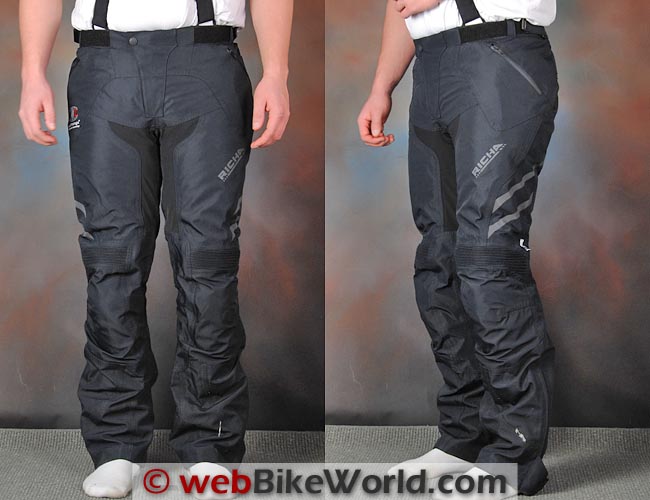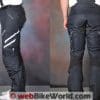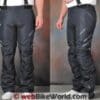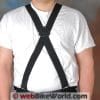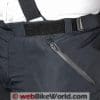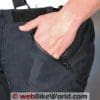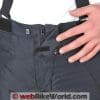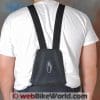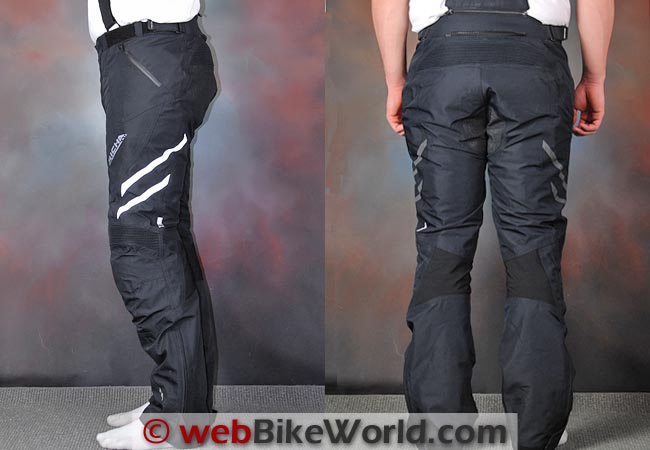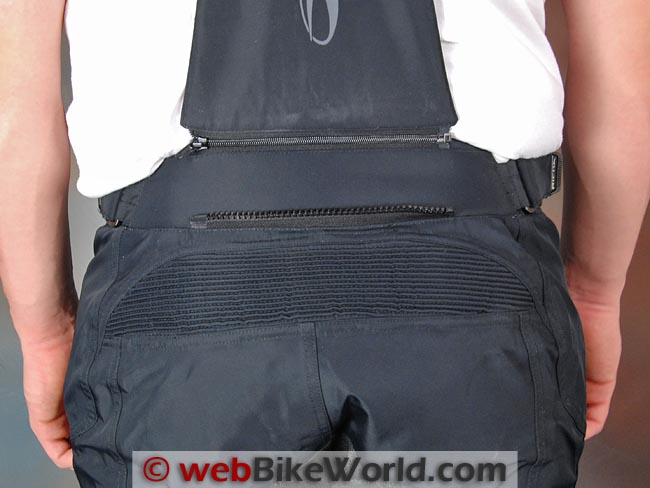The Richa Spirit pants are a natural for pairing with the Spirit jacket.
The pants also include the special Schoeller “c_change” climate adaptive membrane bonded to the Dynatec shell.
The Spirit pants are fully waterproof at the outer boundary layer and they do not require an inner waterproof liner.
The pants are good-looking and well made and they feel substantial without the heavy feeling characteristic of other textile winter motorcycle pants.
See Part I: Richa Spirit Jacket Review
Please refer to Part I of this two-part review, which describes the Richa Spirit jacket in detail.
That review also includes information on the Schoeller textile technologies that Richa has incorporated into the Spirit jacket and pants, so I won’t repeat it here.
Richa clothing is new to the U.S.A., but the brand is very popular in Europe and they manufacturer a full line of motorcycle gear, from boots to gloves and even helmets and luggage.
Hopefully, we’ll see more Richa products coming soon to this side of the pond…and since we can never have too many choices when it comes to motorcycle gear, that’s a good thing!
Richa Spirit Pants Outer Shell Details
The Spirit pants are made from the same Schoeller Dynatec abrasion-resistant fabric used in the Spirit jacket. The “c_change” membrane is bonded to the inside of the Dynatec shell, and the shell is also treated with the Schoeller NanoSphere technology, as I described in the Spirit jacket review.
This makes the pants waterproof (and stain resistant) at the outermost boundary layer, without requiring the use of a waterproof liner; again, the “Holy Grail” of motorcyclists for a waterproof garment.
The c_change membrane is also windproof and it is a “phase change” type of material, which expands or contracts, depending on the ambient temperature and moisture conditions to which it is subjected. Again, this is described in the Spirit jacket review. The absence of an extra waterproof liner also helps make the pants feel lighter in weight than many of the other textile pants we’ve reviewed.
The outer shell fabric used on the Spirit pants feels much different than the outside of the Spirit jacket, for some reason. The material seen as high-visibility yellow in the jacket photos is a thick weave, while the material in the body of the pants is a very fine weave that has a slick feel. The material in the pants is also more flexible or supple than that used in the jacket.
I’m not sure why this is, as both garments are said to be made of the same Schoeller Dynatec textile. But the pants feel comfortable, and they have sections of semi-flexible (or semi-elastic) fabric in back of the knees and along the inside of the crotch, from above the knee, which helps to add comfort.
The pants also have a section of heavy-duty rubberized material sewn in to the seat of the pants, just where the rider will be sitting on a narrow motorcycle saddle. This effectively prevents sliding around, yet there’s enough of the surrounding “slippery” material to allow the rider to quickly move back and forth on the seat when necessary.
Spirit Pants Suspenders
Connecting the pants to the jacket is a safety feature, but it also helps to keep out drafts. The pants also have a built-in suspender arrangement with a removable back. The removable back is lightly padded and this also helps to retain heat in the lower back.
The suspenders are fully elastic, and they cross over the back and chest, as illustrated in the slide show below. Suspenders are almost always a good idea on motorcycle pants, but are rarely employed for some reason.
Actually, some of the warmest pants we’ve tried have a bib in front and in the rear, which covers the chest and lower back. This definitely helps keep out the cold drafts, while also helping to keep the pants securely on the rider during a fall.
In the front, the suspender ends attach to the pants using a fabric loop arrangement sewn in to the top of the waist. The loop is fairly rugged-looking and it has a bar-tacked stitch pattern where it meets the waist, but our experience has been that this type of fabric loop doesn’t last very long.
Since the suspenders remain under constant tension, it would probably be better for Richa to use some type of nylon clip buckle system to hold the suspender ends, similar to those found on luggage straps.
Removable Thermal Liner
The pants include a zip-in thermal liner that can not be worn independently, unlike the nice soft-shell jacket liner of the Spirit jacket.
There isn’t much information available on the Richa website about the construction or thermal properties of the liner, other than to state that it is “100% polyester”. But it appears to be your normal, every-day standard type of quilted thermal liner insert.
It does the job and the c_change membrane definitely keeps out the wind (and helps a bit with the cold), making the pants feel comfortable down to around 40 degrees F (5 C) during my ride evaluations wearing undershorts only underneath.
The thermal liner zips in to the Spirit pants waist with a full-length “Dulon” brand zipper. The bottom of the thermal liner at the legs attaches with two loops (on the pant legs) and snaps on tabs (on the thermal liner legs), located about 16 cm (6″) up from the end of the cuffs.
The slightly short legs of the thermal liner allows the lower part of the leg to retain somewhat of a taper, to fit either over or under a pair of boots. Since these are touring pants and not race pants, an over the boot fit is preferred, so it’s actually nice of Richa to design the legs so the shell fits over the boot top while the liner covers the upper portion of the leg above the boot.
However, there is no outside diameter adjustment for the pants at the leg cuffs. The leg diameter at the cuff measures 20 cm (~8″) and it can only be tightened slightly by using a hook-and-loop tab on the outside of the leg. Like the sleeve cuffs on the Richa Spirit jacket, the leg cuffs don’t have an external dart cut into the fabric that allows a wider range of adjustment.
As mentioned in the Spirit jacket review, another benefit of the C-Change membrane is less bulk in the jacket and pants. There is no need for an additional water/windproof layer and that gives the clothes a better fit. This is most noticeable when wearing the outfit with the thermal liners removed.
Waist, Zipper and Sizing
The pants have a large elastic “accordion” pleat section at the rear, just under the belt. The waist adjustment belt is a heavy-duty item that connects with hook-and-loop pull tabs on either side.
However, the elastic on the sides of the pants offer only a small range of adjustment, about 10 mm (~ 1/2″). If the elastic were wider and/or had deeper pleats, there would be a wider adjustment range.
This problem of too-narrow sections of elastic in motorcycle pants is a common problem we have encountered and noted many times. Why the manufacturers don’t put a big section of elastic on the side of their pants to allow for a generous adjustment range of, say, at least 50 mm (2″) or so is beyond us.
It would be easy enough to do; simply add a big “V” or “U” shaped dart on the sides that runs about 100 mm vertically down the sides of the pants at the waist, and fill it with pleated elastic. Then a waist adjustment belt would really mean something.
As it is implemented on the Richa Spirit pants, the narrow range and shallow depth of the elastic on the sides of the waist limits the amount of expansion. This means that you’ll have to be more careful when you size the pants, because you can’t count on much “breathing room” in the waist.
These size XL Spirit pants fit about a 34″ to 35″ waist, which seems small for a traditional size XL. The distance between the top of the waist and the crotch also feels a bit short, although it isn’t bothersome once I’m sitting on the bike. Fortunately, the undersized diameter runs all the way down the legs, so the pants fit rather well in the legs. The pants also gain about 1/2 size with the liner removed.
The inseam, measured from the center of the crotch on the inside of the leg to the tip of the leg cuff, is 34″ on this size XL. This is about right and provides just enough coverage for the bottom of the legs when the legs are bent in the riding position.
Don’t forget that motorcycle pants will look long when you’re standing or walking but that extra 2″ to 3″ (I normally take a 30.5″ inseam” is needed to account for the bending of the legs when you’re sitting on the bike.
The pants do have a metal hook at the waist, although they don’t have a separate button snap; the hook is all that holds them. I prefer both but I’ll take a hook over just a snap any day. The pants have a zipper fly backed by fabric.
Pockets
The Spirit pants feature two waterproof slash pockets in front. Each uses a waterproof YKK zipper. The pockets are deep and lined with a polyester taffeta-like material.
Safety, Armor and Protection
Richa includes CE-approved armor in the knees of the Spirit pants and thick padding at the hips. The armor in the pants is not Level 2, as far as I can tell. It’s a softer type of armor or protection without the hard backing found on the Level 2 armor used in the elbows and shoulders of the jacket.
The hip padding does feel thicker and larger than is usually found in textile touring pants, however.
Like the Spirit jacket, the Richa Spirit pants do not have vents. Again, the idea is that the vents could actually defeat the functionality of the C-Change membrane when the incoming air bypasses the system.
Vents probably wouldn’t be missed much in pants anyway; I rarely, if ever, open pants vents when I’m riding. If it’s hot enough to need pant vents, it usually means it’s hot enough to be wearing mesh or hybrid mesh pants anyway. So the absence of vents in the Spirit pants doesn’t bother me at all — in fact, I see it as a benefit, because it decreases the complexity and weight and eliminates the chance of water leaking through a vent zipper.
| The wBW Opinionator: Richa Spirit Pants | |
|---|---|
| Picks… | …and Pans. |
|
|
Conclusion
The Spirit pants are certainly the perfect match for the Spirit jacket. Although a few details on the pants could be improved, overall they give a rugged and reliable impression.
The pants are comfortable and they have that “protective shell” feeling. The textile has a surprisingly different feel and texture than the Spirit jacket and the material also feels different than other motorcycle pants, so you know something is special.
Richa offers a large sizing range for the Spirit pants, although no shorts or longs are listed in the catalog. With the correct fit, the armor and padding stays in the correct location, which also helps.
The Spirit pants are completely waterproof and don’t need an extra liner, so you’ll never have to worry about changing pants on the side of the road — always more problematic than changing a jacket.
And the c_change material does seem to work. The pants weren’t hot at all in our indoor warmth evaluations and in the current winter weather riding conditions, the c_change technology seemed to make it feel about 10 degrees warmer than indicated on the bike’s thermometer.
The cost of the Spirit pants may be a bit difficult to overcome. That should not stop you from enjoying a Spirit jacket however, which has a lot of technology for the money. If you’d rather spend a decent amount of money on one good outfit that will probably outlast a bike or two, it would be hard to beat a Richa Spirit jacket and pants combo.
It’s still less expensive than some of the competition for high-end motorcycle gear, yet it probably has more technology than any other brand.
Part I: Richa Spirit Jacket Review Also: Richa Arctic Gloves Review
|
wBW Product Review: Richa Spirit C-Change Pants
|
|
|---|---|
| Manufacturer: Richa NV (Belgium) | List Price: $579.99 (larger sizes +$60.00). |
| Colors: Black/black. | Made In: Unknown |
| Sizes: S to 8XL. | Star Rating (1-5): |
| Review Date: January 2012 | |
|
Note: Item was provided by a retailer, distributor or manufacturer with these Terms and Conditions.
|
|
Owner Comments and Feedback
See details on submitting comments.


